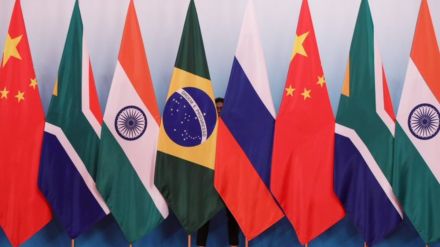In a significant development for the global order, Indonesia has officially joined the BRICS group, marking a new phase for the bloc that brings together some of the world’s most influential emerging economies. The announcement, made by Brazil on Tuesday, reveals that the Southeast Asian nation now joins Brazil, Russia, India, China, and South Africa as a full member of the group. This milestone is further underscored by Indonesia’s expected presence as the chief guest at India’s Republic Day celebrations, symbolizing the strengthening ties between the two nations.
Indonesia’s Strategic Entry to BRICS
Indonesia, the world’s fourth-largest country by population, has long expressed interest in becoming part of BRICS. Its membership has been seen as a strategic move to enhance collaborations with other developing nations and strengthen its position within the Global South. The Indonesian government welcomed the decision, highlighting its commitment to multilateralism and reforming global governance to create a more inclusive and fair global order.
For Indonesia, joining BRICS is not just about economic cooperation but also political alignment. It seeks to increase partnerships with other emerging nations, championing the interests of the Global South. Indonesia’s official entry into BRICS comes after the completion of its presidential elections, with President Prabowo Subianto taking office in October 2024. Prior to this, BRICS leaders had endorsed Indonesia’s candidacy at the 2023 summit in Johannesburg, and the formal accession process was delayed until the formation of the new government.
Indonesia’s accession reflects a broader trend of BRICS expansion. Alongside Indonesia, countries like Egypt, Ethiopia, Iran, and the UAE have also joined the group in recent years, signalling its growing appeal among developing nations.
The Significance for BRICS and India
Indonesia’s entry is a noteworthy milestone for BRICS. As the largest economy in Southeast Asia, Indonesia’s membership strengthens the bloc’s influence in the Asia-Pacific region. More importantly, it brings a strategic partner that shares the BRICS commitment to reforming global governance institutions, an area where India has long played a leading role.
For India, Indonesia’s membership is particularly significant. As a key member of BRICS, India has championed the group’s efforts to promote South-South cooperation, enhance political and economic cooperation among emerging economies, and reduce dependence on Western-dominated global institutions. Indonesia’s addition to the bloc enhances India’s ability to build stronger ties with Southeast Asia, a region that plays a crucial role in global trade, security, and geopolitics.
Moreover, the BRICS grouping serves as a counterweight to the influence of Western powers, particularly the Group of Seven (G7) nations, which include the United States, Canada, and several European countries. With Indonesia now on board, BRICS not only increases its collective influence in global governance but also enhances its ability to advocate for policies that favour developing countries in areas such as trade, infrastructure, and financial reform.
BRICS’ Growing Global Influence
BRICS has evolved since its inception in 2009, when it was originally formed by Brazil, Russia, India, and China, and later expanded in 2010 to include South Africa. The group was conceived as a counterbalance to the G7, with a focus on amplifying the voices of emerging economies and challenging the Western-led global financial system.
Prior to Indonesia’s membership, BRICS already accounted for a significant portion of the world’s economic output, representing 35% of global GDP and 46% of the world’s population. With the addition of new members like Indonesia, Iran, Egypt, Ethiopia, and the UAE, BRICS continues to grow its influence, which could have far-reaching consequences for global trade, finance, and geopolitics.
One of the bloc’s most important objectives is to reduce reliance on the US dollar in international transactions, an agenda that has gained momentum in recent years. In its most recent summit, held in October 2024, BRICS members discussed initiatives to strengthen local currencies and promote non-dollar transactions, a move that could reshape the future of global trade and finance.
What Does the Future Hold for BRICS?
With Saudi Arabia, Turkey, Malaysia, and Azerbaijan expressing interest in joining BRICS, the group’s expansion is likely to continue. As it grows, BRICS is positioning itself as a key player in reshaping the global order, advocating for greater equity, inclusivity, and reform in global institutions like the International Monetary Fund (IMF) and the United Nations (UN).
For India, Indonesia’s entry marks a significant step in deepening its regional influence, particularly in Southeast Asia. As BRICS continues to expand, it also presents India with opportunities to strengthen its role as a leader of the Global South and advocate for policies that reflect the interests of emerging economies.
